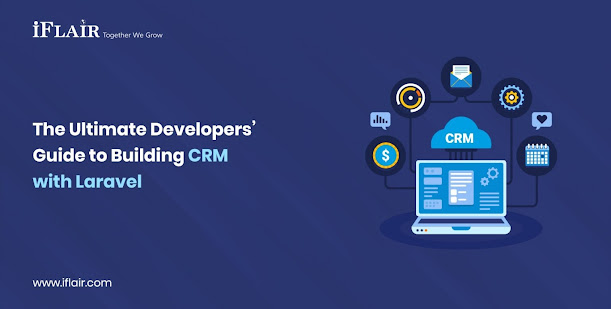The Ultimate Developers’ Guide to Building CRM with Laravel
Customer Relationship Management (CRM) systems are indispensable tools for businesses to manage their interactions with current and potential customers. As businesses grow, the complexity of managing customer relationships increases, making it vital to have a CRM system that is both scalable and customizable. Laravel, a powerful PHP framework, offers an excellent solution for building feature-rich Laravel CRM systems with minimal effort and maximum flexibility.
Building a CRM with Laravel is a smart choice for businesses looking to streamline their customer relationship management processes. Laravel, known for its elegance and powerful features, provides the perfect framework for creating a custom CRM system that is both scalable and flexible. With Laravel CRM development, businesses can easily manage customer data, sales processes, and communications, all in one centralized system. Whether you’re aiming to build a CRM with Laravel from scratch or enhance an existing system, Laravel service providers offer robust tools and packages to extend functionality and optimize performance.
In this ultimate guide, we’ll explore how to build a CRM with Laravel, highlight its key features, and explain why Laravel is one of the best choices for CRM development. Whether you’re a developer looking to build a custom CRM or a business owner evaluating options for CRM development, this article will provide you with in-depth knowledge of how to leverage Laravel for CRM solutions.
Why Build CRM with Laravel?
Laravel is a popular PHP framework known for its elegant syntax, robust features, and ability to simplify complex web application development tasks. A CRM system built on Laravel offers flexibility, and powerful functionality, and is equipped to handle complex workflows and high-security requirements. With its modular architecture and efficient database management, Laravel allows businesses to create a CRM tailored to their unique processes and objectives. Laravel Development Agencies can leverage this framework’s advanced features, like task scheduling and role-based access control, to provide businesses with comprehensive Laravel CRM development services.
Here’s why Laravel stands out when it comes to building a CRM system:
Scalability
Laravel provides a solid foundation for developing scalable applications. As your CRM grows with more features and more users, Laravel’s built-in support for caching, database migrations, and queues ensures your CRM can handle increased demand.
Security
Laravel prioritizes security and provides built-in protection against common vulnerabilities like SQL injection, cross-site scripting (XSS), and cross-site request forgery (CSRF). For CRM systems that handle sensitive customer data, security is a top priority, and Laravel offers tools like encryption, secure password storage, and more.
Authentication and Authorization
Laravel comes with robust authentication and authorization systems out of the box. This is crucial for managing user roles, permissions, and access levels within your CRM system.
Eloquent ORM
Laravel’s Eloquent ORM simplifies database interactions, allowing developers to interact with databases using an expressive, object-oriented syntax. This makes it easier to model complex relationships between customers, tasks, and sales processes in a CRM.
MVC Architecture
Laravel follows the Model-View-Controller (MVC) architecture, which ensures clean separation of logic and presentation. This makes the application easier to maintain and extend, allowing developers to focus on specific components without worrying about the entire application structure.
Read More, https://www.iflair.com/the-ultimate-developers-guide-to-building-crm-with-laravel/




Comments
Post a Comment